Ability Scores
Standard ST (Strength) DX (Dexterity) WS (Wisdom) IQ (Intelligence) CN (Constitution) CH (Charisma) and CM (Comeliness) are generated as follows:
ALL abilities start at 8
Roll 8d6 discard the lowest (or one of the lowest.)
You may assign one or two of the remaining dice scores to any Ability.
You MAY NOT Assign more the 2 dice to any one Ability
You MAY NOT Have an Ability Score GREATER THEN 18
You MAY NOT Use any remaining dice points on another Ability. Excess points are LOST.
Example:
The dice rolls are 2, 4, 4, 6, 1, 3, 6, 5
Discard the 1
Remaining dice are 2, 4, 4, 6, 3, 6, 5
ST: 8 + 3 = 11
DX: 8 + 6 = 14
WS: 8 + 5 = 13
IN: 8 + 4 = 12
CH: 8 + 2 = 10
CN: 8 + 6 + 4 = 18
CM: 8 + 0 = 8
Alternatively CH could be left at 8 and the remaining 2 moved to DX resulting in a score of 16 Other combinations are possible.
However, 8 + 6 + 6 will ONLY EQUAL 18 Not 20! Those two extra points are lost, UNLESS the score is for ST. If two dice rolls are assigned to ST and the total exceeds 18 then the character has exceptional ST.
If the total is 19 the character’s ST may range between 18:01 to 18:50 Roll 1d10 and multiply the result by 5.
If the total is 20 the character’s ST may range between 18:51 to 18:00 Roll 2d10 01-49 = 18:51 to 18:75 A Roll of 50-76 = 18:76 to 18:90 A Roll of77-94 = 18:91 to 18:99 A Roll of 95-100 = 18:00
In general Ability scores are on the high side in this campaign. You WILL NEED THEM!
Note: Comeliness (CM) is determined in a different fashion (See section on Comeliness below) and should not be rolled or calculated UNTIL Charisma has been determined.
Using Abilities
An Ability Check is a d20 roll against one of your character’s ability scores (modifiers may be added to or subtracted from the die roll). A result that is equal to or less than your character’s ability score indicates that the attempted action succeeds.
Sub Stats
These are calculated using Ability scores. Will Power and Fortitude are Sub Stats that are used to determine certain involuntary reactions and the characters mental strength.
Will Power = (WS + IN) /2 This is used when the character is resisting interrogation, attempting to intimidate an opponent, or be intimidated. It is also used in resisting some types of non magical control (drugs or hypnosis) or to see if the character inadvertently gave something away during questioning, drunken prattle or while trying to impress someone in a social or sexual encounter. Holding still for a surgical procedure without anesthesia, is another example of Will Power. Resisting an impulse to do something that the character knows is wrong, but seems like fun or being beneficial to the character, etc.
Fortitude = (IN + CN) /2 This is used when the character is confronted with an exceptionally revolting sight or smell, for example; discovering a partially decomposed corpse, or entering a sewer… Especially at initial contact. Having to eat spoiled or some raw foods, drink a noxious potion or bad tasting medicine, etc.
NOTE: When calculating Sub Stats, round the results UP. Ex: (WS12 + IN13)/2 = 25/2= 12.5 rounded up to 13.
Skills are based on Ability scores. See Skills for more details.
Strength
Strength (ST) measures a character’s muscle, endurance, and stamina. This ability is the prime requisite of fighters because they must be physically powerful in order to wield melee weapons for maximum effect. Note: Strength is also useful for overcoming recoil in some of the larger firearms.
Furthermore, strength improves the character’s chance to hit an enemy, increases the damage he causes with each hit, increases the weight the character is able to carry without a penalty for encumbrance (see below), and increases the character’s ability to force open doors and similar portals.
NOTE: Firearms NEVER benefit from Strength Bonuses to Hit or Damage.
The rest of this section on Strength consists of explanations of the columns in Table 1.
Refer to the table as you read.
Hit Probability adjustments are added to or subtracted from the attack roll rolled on 1d20 (one 20-sided die) during combat. A bonus (positive number) makes the opponent easier to hit; a penalty (negative number) makes him harder to hit.
Damage Adjustment also applies to combat. The listed number is added to or subtracted from the dice rolled to determine the damage caused by an attack (regardless of subtractions, a successful attack roll can never cause less than 1 point of damage). For example, a short sword normally causes 1d6 points of damage (a range of 1 to 6). An attacker with Strength 17 causes one extra point of damage, for a range of 2 to 7 points of damage. The damage adjustment also applies to MUSCLE POWERED missile weapons, although bows must be specially made to gain the bonus and crossbows never benefit from the user’s Strength.
Weight Allowance is the weight (in pounds) a character can carry without being encumbered (encumbrance measures how a character’s possessions hamper his movement. These weights are expressed in pounds. A character carrying up to the listed weight can move his full movement rate.
Maximum Press is the heaviest weight a character can pick up and lift over his head. A character cannot walk more than a few steps this way. No human or humanoid creature without exceptional Strength can lift more than twice his body weight over his head. In 1987, the world record for lifting a weight overhead in a single move was 465 pounds. A heroic fighter with Strength 18/00 (see Table 1) can lift up to 480 pounds the same way and he can hold it overhead for a longer time!
Open Doors indicates the character’s chance to force open a heavy or stuck door. When a character tries to force a door open, roll 1d20. If the result is equal to or less than the listed number, the door opens. A character can keep trying to open a door until it finally opens, but each attempt takes time (exactly how much is up to the DM) and makes a lot of noise. Numbers in parentheses are the chances (on 1d20) to open a locked, barred, or magically held door, but only one attempt per door can ever be made. If it fails, no further attempts by that character can succeed.
Bend Bars/Lift Gates states the character’s percentage chance (rolled on percentile dice) to bend normal, soft iron bars, lift a vertical gate (portcullis), or perform a similar feat of enormous strength. When the character makes the attempt, roll percentile dice. If the number rolled is equal to or less than the number listed on Table 1, the character bends the bar or lifts the gate. If the attempt fails, the character can never succeed at that task. A character can, however, try to bend the bars on a gate that he couldn’t lift, and
vice versa.
Table 1: Strength
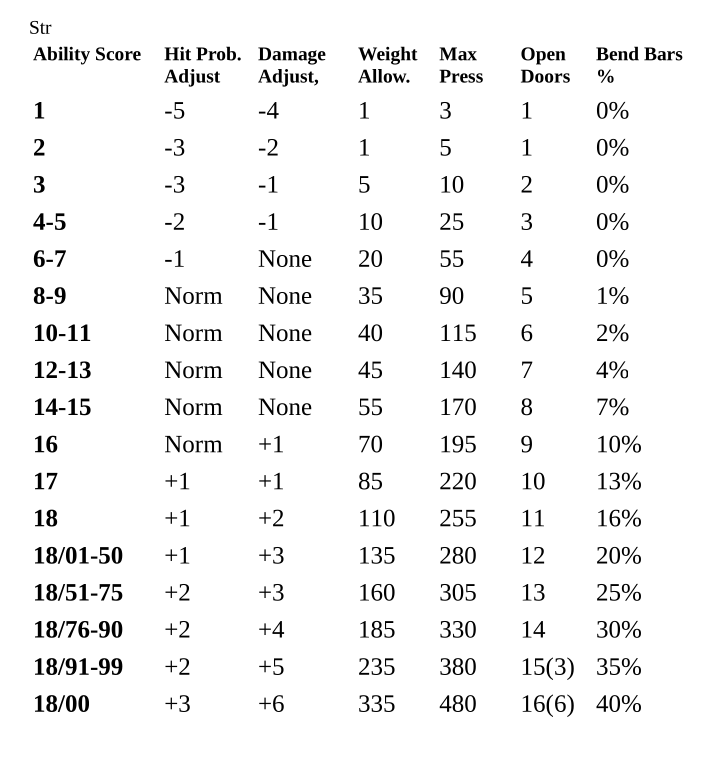
Dexterity
Dexterity (DX) encompasses several physical attributes including hand-eye coordination, agility, reaction speed, reflexes, and balance. Dexterity affects a character’s reaction to a threat or surprise, his accuracy with thrown weapons, bows and guns. And his ability to dodge an enemy’s blows and aim. It is the prime requisite of rogues and affects many of their professional skills.
Reaction Adjustment modifies the die roll and adjusts the characters Initiative Roll in Combat. Initiative Rolls EVERY character involved in combat will make an Initiative Roll. This is done with a d10. The point on the d10 represents a second in the upcoming combat round at which point the character may act. The lower the number rolled the earlier in the round the character may act. Dexterity can modify the Initiative roll. High DX allows the character to react more quickly, while low DX slows responses. Other events, such as Surprise and distractions can also affect Initiative.
Missile Attack Adjustment is used to modify a character’s die roll whenever he uses a missile weapon (a bow, crossbow, firearm or thrown weapon). A positive number makes it easier for the character to hit with a missile, while a negative number makes it harder.
Defensive Adjustment applies to a character’s saving throws against attacks that can be dodged–lightning bolts, boulders, etc. It also modifies the character’s Armor Class, representing his ability to dodge normal missiles and parry weapon thrusts. For example, Rath’s normal AC is 10 and his Dexterity score is 16, his Armor Class is modified by -6 to 4, making him harder to hit. If his Dexterity score is 5, his Armor Class is modified by +2 to 12, making him easier to hit. (In some situations, beneficial Dexterity modifiers to Armor Class do not apply. Usually this occurs with simple touch attacks or attacks from behind or when his movement is restricted–attacked while prone, tied up, on a ledge, climbing a rope, etc.)
NOTE: Body armor, the staple of battlefields for millennium, has largely been relegated to museums and ceremonial functions. Firearm and gunpowder improvements in the last fifty years have rendered most armor obsolete. Being fleet of foot is essential in modern combat. Dexterity is the key to survival. AC bonuses based on Class and level (See Defense Bonus Table) have been added to increase survivability in a otherwise ‘armorless’ world. Wearing Armor negates some of this Defensive Bonus. (SeeArmor and AC) for details.
Table 2: Dexterity
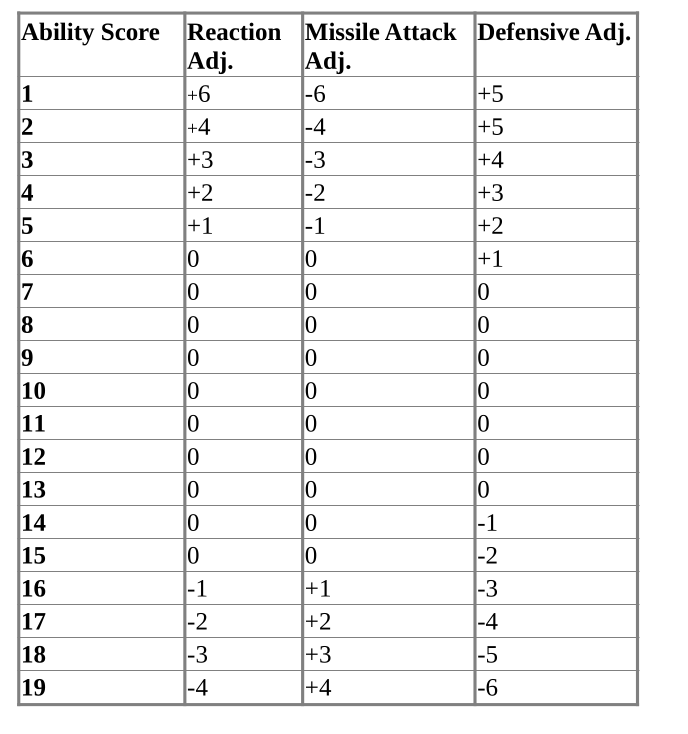
If you opt to invest in body armor (see descriptions Armor and AC) you use ONLY the Defensive Adjustment column in the above chart.
If you skip body armor, you ALSO add the Unarmored Defensive Bonus below based on your level and class.
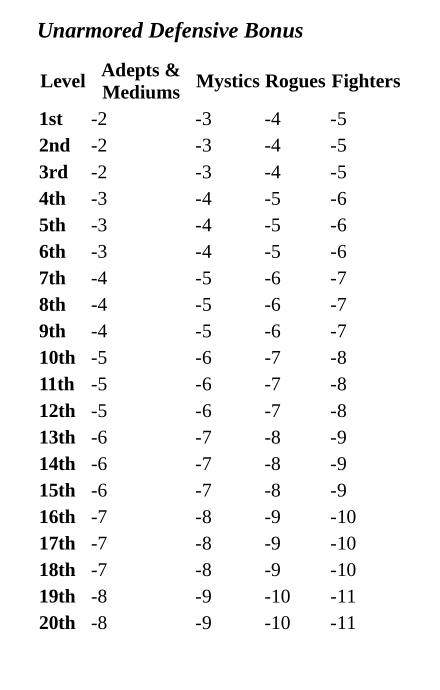
Constitution (Health)
A character’s Constitution (CN) score encompasses his physique, fitness, health, and physical resistance to disease. It also determines how much REAL damage he can take before he dies. (SEE HIT POINTS BELOW.)
This ability also affects the character’s hit points and chances of surviving such shocks as being physically reshaped by magic, it is vitally important to all classes.
A character’s initial Constitution score is the absolute limit to the number of times the character can be raised or resurrected from death. Each such revival reduces the character’s Constitution score by one. Magic can restore a reduced Constitution score to its original value or even higher, but this has no effect on the number of times a character can be revived from death! Once the character has exhausted his original Constitution, nothing short of divine intervention can bring him back.
Hit Point Adjustment is added to or subtracted from each Hit Die rolled for the character. However, no Hit Die ever yields less than 1 hit point, regardless of modifications. If an adjustment would lower the number rolled to 0 or less, consider the final result to be 1. Always use the character’s current Constitution to determine hit point bonuses and penalties. The Constitution bonus ends when a character reaches 10th level neither the Constitution bonus nor Hit Dice are added to a character’s hit points after he has passed this level (see the character class descriptions in Chapter 3). If a character’s Constitution changes during the course of adventuring, his hit points may be adjusted up or down to reflect the change. The difference between the character’s current hit point bonus (if any) and the new bonus is multiplied by the character’s level (up to 10) and added to or subtracted from the character’s total. If Delsenora’s Constitution increased from 16 to 17, she would gain 1 hit point for every level she had, up to 10th level.
System Shock states the percentage chance a character has to survive magical effects that reshape or age his body: petrification (and reversing petrification), polymorph, magical aging, etc. It can also be used to see if the character retains consciousness in particularly difficult situations. For example, an evil Adept polymorphs his dim-witted hireling into a crow. The hireling, whose Constitution score is 13, has an 85% chance to survive the change. Assuming he survives, he must successfully roll for system shock again when he is changed back to his original form or else he will die.
Poison Save modifies the saving throw vs. poison. The DM has specific information on saving throws.
When a character’s hit point total drops to 0, he or she starts taking damage to his Constitution. When Constitution drops to -1 he is dying. When it drops to –X (CN), the character is dead.
Table 3: Constitution
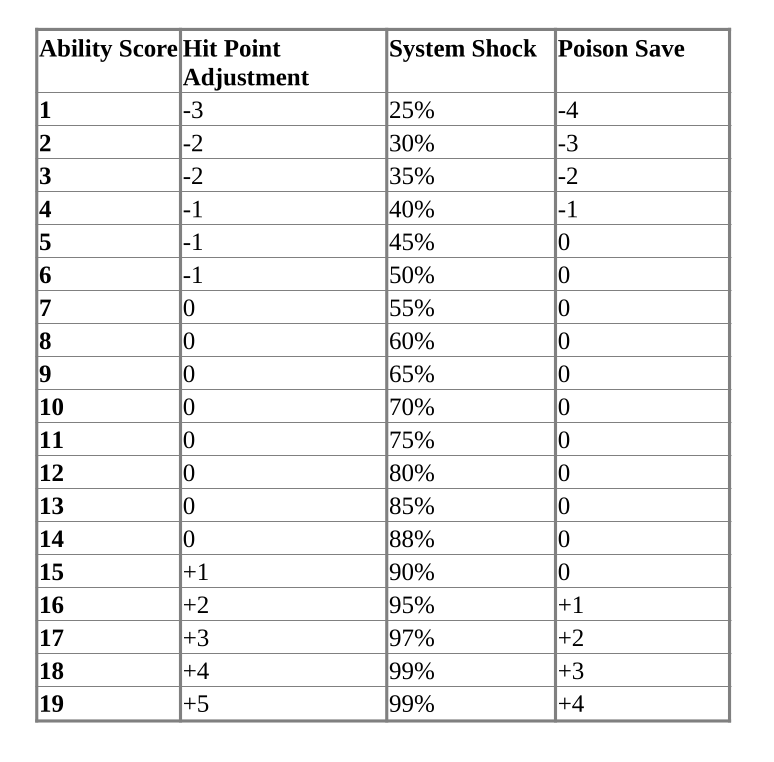 elligence score; you must provide your character with the
elligence score; you must provide your character with the
Hit Points vs Health (Constitution)
Hit Points are different in Victorian Dreadful then in most other AD&D games. Hit Points are a reflection of Toughness, vitality and your ability to shrug off pain, discomfort and fatigue. Losing all your Hit Points will not, in and of itself, kill you!
Your Constitution score reflects your actual Health. Losing all your Constitution points CAN kill you!
We have all watched the hero, and some villains, in a movie take a terrific battering. Punched, kicked, slashed, cut, clubbed, thrown from windows… He is bloodied, bruised, winded, staggered, but still able to fight on and when it is over walk away. The damage he took was to Hit Points, not Health (Constitution.)
When a character is hit by a blow or a bullet in the normal course of events, the damage is deducted from Hit Points ONLY. Until such time as all the Hit Points have been used up. After that any damage is deducted from Constitution.
Blows to Hit Points cause minimal bodily harm. Bruises, scratches, abrasions…. They wear a character down, stunning him, dazing him, making him hurt, but are not inherently life threatening. These losses can be restored through normal healing and time or Cure Light Wounds (if available.)
Damage to Constitution reflects REAL SERIOUS injuries. These are the types of wounds that represent holes in the body, blood loss, etc… And these injuries require more advanced medical care, Physician or Surgeon in attendance or Cure Serious or Cure Critical Wounds.
When a character’s hit point total drops to 0, he or she starts taking damage to his Constitution. When Constitution drops to -1 he is dying. When it drops to –X (CN score) the character is dead.
Example:
A Rogue with a Constitution of 13 and 9 Hit Points takes 8 points damage leaving him with 1 hit point and full health. The next round he takes 3 points damage. One point subtracts the Rogue’s last Hit Point, the other 2 are deducted from his Constitution Score. CN 13-2 = 11. The next time he is hit he takes 8 points damage. 11 – 8 = 3 The next round he takes 5 points damage. His Constitution is now -2. He is Unconscious and BLEEDING at a rate of 1 point per MINUTE.
As he is laying on the field of battle a nearby explosion inflicts damage of 18 points to everyone present. The Rogue was -2 he is now -20. His Constitution was 13. He is dead.
A Character with 25 Hit Points and a Constitution of 11 can absorb 47 points of damage before he or she is irretrievably DEAD. (This may seem like a lot but keep in mind that bullets can do a lot of damage and there is no known way to bring someone back from the dead in Victorian Dreadful!)
Also, that same character can continue functioning, fighting, casting spells, etc until he or she has absorbed 36 points of damage. The last 11 being the type that causes major spurts of blood, intestines slipping out, limbs mutilated….
Exception: Critical Hits. Damage from Critical Hits, regardless of weapon type, go to the target’s Constitution!
Gaining Hit Points
Each time a character goes up a level he rolls the appropriate hit dice for the class, d6 for Adepts, d8 for Mystics and Rogues and so on. The character’s Constitution bonus, if it applies, is added to the roll and the result is added to the character’s current maximum hit points.
Maximum Hit Points
NO CHARACTER CAN HAVE MORE THEN 10x THEIR CONSTITUTION IN HIT POINTS REGARDLESS OF LEVEL OR CLASS.
Once a character reaches that total they may not gain anymore Hit Points regardless of level.
Intelligence
Intelligence (IN) represents a character’s memory, reasoning, and learning ability, including areas outside those measured by the written word. Intelligence dictates the number of languages a character can learn. Intelligence is a prime requisite of Adepts, who must have keen minds to understand and memorize magical spells. The Adept’s Intelligence dictates which spells he can learn and the number of spells he can memorize at one time. Only those of the highest Intelligence can comprehend the mighty magic of 9th-level spells. Adepts with an Intelligence of 12 or higher are able to memorize more spells then those of lesser intelligence.
This ability gives only a general indication of a character’s mental acuity. A semi-intelligent character (Int 3 or 4) can speak (with difficulty) and is apt to react instinctively and impulsively. He is not hopeless as a player character (PC), but playing such a character correctly is not easy. A character with low Intelligence (Int 5-7) could also be called dull-witted or slow. A very intelligent person (Int 11 or 12) picks up new ideas quickly and learns easily. A highly intelligent character (Int 13 or 14) is one who can solve most problems without even trying very hard. One with exceptional intelligence (Int 15 or 16) is noticeably above the norm. A genius character is brilliant (Int 17 or 18). A character beyond genius is potentially more clever and more brilliant than can possibly be imagined.
However, the true capabilities of a mind lie not in numbers–I.Q., Intelligence score, or whatever. Many intelligent, even brilliant, people in the real world fail to apply their minds creatively and usefully, thus falling far below their own potential. Don’t rely too heavily on your character’s Intelligence score; you must provide your character with the creativity and energy he supposedly possesses!
Number of Skill Points/Languages lists the number of additional skill points the character the character has at the start of the game. These extra Skill Points can be used however the player desires.
Note About Languages: Every character can speak his native language, no matter what his Intelligence is. This knowledge extends only to speaking the language; it does not automatically include reading or writing.
The player may opt to spend any or all of these points on additional languages. However, the DM can limit your language selection based on the campaign and the character’s background. It is perfectly fair to rule that your fighter from the frozen wastes of Russia doesn’t know Swahili, simply because he has never met anyone who speaks Swahili.
The character never needs to spend any Skill Points to speak his native language.
Spell Level lists the highest level of spells that can be cast by an Adept with this Intelligence.
Chance to Learn Spell is the percentage probability that a Adept can learn a particular spell. A check is made as the Adept comes across new spells, not as he advances in level. To make the check, the Adept character must have access to a spell book containing the spell. If the player rolls the listed percentage or less, his character can learn the spell and copy it into his own spell book. If the Adept fails the roll, he cannot check that spell again until he advances to the next level (provided he still has access to the spell).
Maximum Number of Spells per Level This number indicates the maximum number of spells a Adept can know from any particular spell level. Once a Adept has learned the maximum number of spells he is allowed in a given spell level, he cannot add any more spells of that level to his spell book (unless the optional spell research system is used). Once a spell is learned, it cannot be unlearned and replaced by a new spell.
For example, Delsenora the Adept has an Intelligence of 14. She currently knows
seven 3rd-level spells. During an adventure, she finds a musty old spell book on the shelves of a dank, forgotten library. Blowing away the dust, she sees a 3rd-level spell she has never seen before! Excited, she sits down and carefully studies the arcane notes. Her chance to learn the spell is 60%. Rolling the dice, Delsenora’s player rolls a 37. She understands the curious instructions and can copy them into her own spell book. When she is finished, she has eight 3rd-level spells, only one away from her maximum number.
If the die roll had been greater than 60, or she already had nine 3rd-level spells in her spell book, or the spell had been greater than 7th level (the maximum level her Intelligence allows her to learn), she could not have added it to her collection.
Illusion Immunity This reflects the fact that certain, rare, individuals who gain extremely high intelligence scores are able to instantly spot the mistakes and errors that give away simple illusions. Intelligence scores over 18 are only obtainable through magic or the experience and knowledge of age.
Table 4:
Intelligence
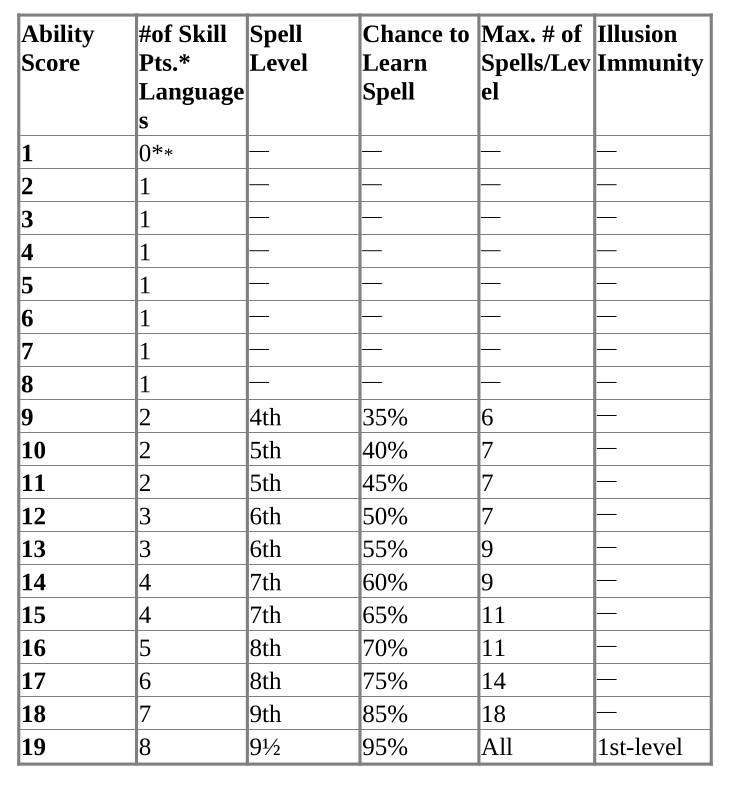 * All characters MUST have at least one language (their native tongue) HOWEVER, the extra languages may be substituted for additional Non Weapon Proficiencies at character creation.
* All characters MUST have at least one language (their native tongue) HOWEVER, the extra languages may be substituted for additional Non Weapon Proficiencies at character creation.
** While unable to speak a language, the character can still communicate by grunts and gestures.
Wisdom
Wisdom (WS) describes a composite of the character’s enlightenment, judgment, guile, common sense, and intuition. It can affect the character’s resistance to magical attack. It is the prime requisite of Mystics. Mystics with Wisdom scores of 13 or higher gain bonus spells over and above the number they are normally allowed to use.
Magical Defense Adjustment listed on Table 5 applies to saving throws against magical spells that attack the mind: beguiling, charm, fear, hypnosis, illusions, possession, suggestion, etc. These bonuses and penalties are applied automatically, without any conscious effort from the character.
Fear & Horror Checks are made against the Magical Defense Adjustment as well. Modifiers that may affect these roles are determined by the DM as appropriate.
Bonus Spells indicates the number of additional spells a Mystic (and only a Mystic) is entitled to because of his extreme Wisdom. Note that these spells are available only when the Mystic is entitled to spells of the appropriate level. Bonus spells are cumulative, so a Mystic with a Wisdom of 15 is entitled to two 1st-level bonus spells and one 2nd-level bonus spell.
Chance of Spell Failure states the percentage chance that any particular Mystic spell fails when cast. Mystics with low Wisdom scores run the risk of having their spells fizzle. Roll percentile dice every time the Mystic casts a spell; if the number rolled is less than or equal to the listed chance for spell failure, the spell is expended with absolutely no effect whatsoever. Note that Mystics with Wisdom scores of 13 or higher don’t need to worry about their spells failing.
Spell Immunity gives those extremely wise characters complete protection from certain spells, spell-like abilities, and magical items as listed.
Table 5: Wisdom
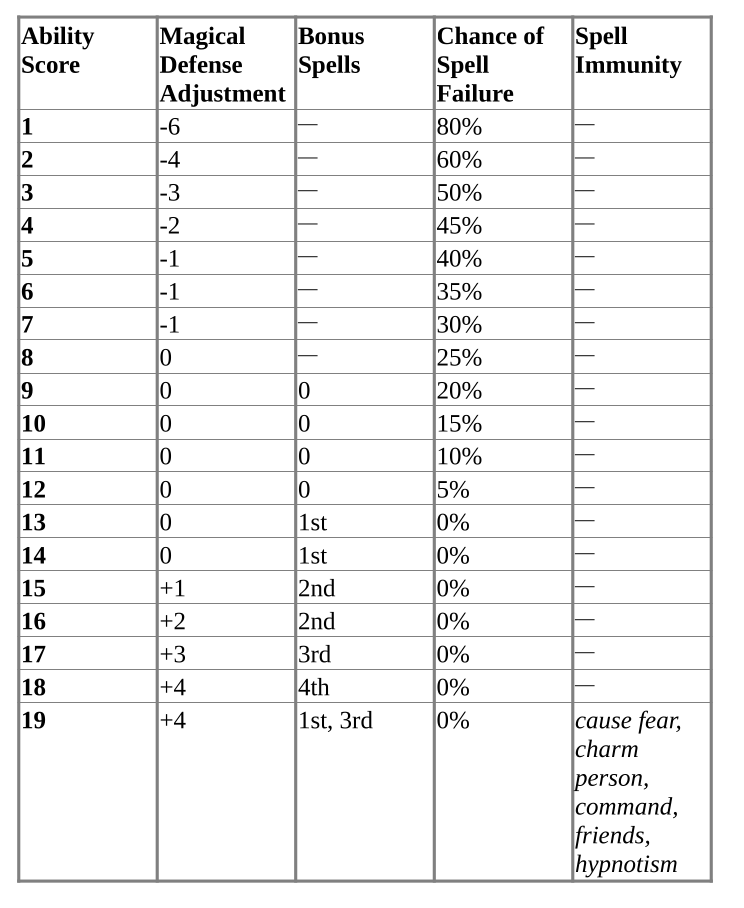
Charisma
The Charisma (CH) score measures a character’s persuasiveness, personal magnetism, social grace and ability to lead. It is not a reflection of physical attractiveness, although attractiveness certainly plays a role. It is important to all characters, but especially to those who must deal with nonplayer characters (NPCs), mercenary hirelings, retainers, and intelligent monsters. It dictates the total number of henchmen a character can retain and affects the loyalty of henchmen, hirelings, and retainers.
Maximum Number of Henchmen states the number of nonplayer characters who will serve as permanent retainers of the player character. It does not affect the number of mercenary soldiers, men-at-arms, servitors, or other persons in the pay of the character.
Loyalty Base shows the subtraction from or addition to the henchmen’s and other servitors’ loyalty scores (in the DMG). This is crucial during battles, when morale becomes important.
Reaction Adjustment indicates the penalty or bonus due to the character because of Charisma when dealing with nonplayer characters and intelligent creatures. NOTE: A character’s reputation can impact Reaction Adjustment rolls, reducing or enhancing those rolls based on what the non player character has heard about the character. Example: Dr Hannibal Lecter was a highly charismatic and charming individual, a fact that made him a successful serial killer. But KNOWING that Dr Lecter was a serial killer and cannibal generally caused a negative reaction upon meeting him. Additionally, Social Class will impact Reaction Rolls. Generally speaking, Higher Class non player characters will have some level of negative reaction to lower class characters while Lower Class NPCs will (usually) have some degree of positive reaction to Higher Class characters.
Table 6: Charisma
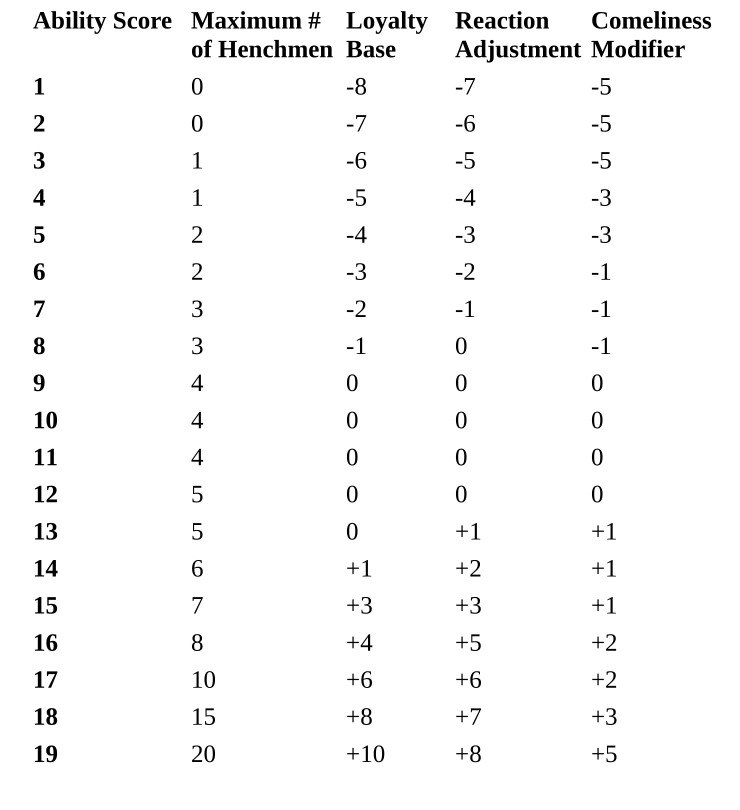
Comeliness
Comeliness: Comeliness (CM) reflects physical attractiveness and personal beauty of the character. It is used to determine initial reactions to the character, and characters with a high comeliness may affect the wills and actions of others. While charisma deals specifically with leadership and interactions between characters, comeliness deals with attractiveness and first impressions.
Characters generated in the manner described above will have a minimum starting Comeliness of 8. Lower numbers are only possible through events that might occur in the course of an adventure.
Comeliness is not charisma. Charisma, however, can affect comeliness. After the first six attributes of a character are determined, his or her looks must be determined. Is the character ugly, homely, plain, or pretty? This characteristic is determined by the comeliness score, which will be somewhere between 8 and 18 before it is modified:
Characters will start with a charisma of AT LEAST 8 which yields a modifier of -1 to comeliness. For charisma of 9-1 2, no adjustment; for 13-15, + 1 ; for 16-1 7, + 2; for 18, + 3; and for charisma of more than 18, +5. As charisma is raised or lowered, whether by behavior, reputation, magic or artifacts, comeliness should be similarly affected on a point-for-point basis (a loss of one point of charisma equals one point of comeliness equally lost).
Comeliness will have the following effects on creatures of human sort.
-10 or lower: Revolting! Those viewing a character with comeliness this low are repulsed and horrified, so as to turn away or attempt to destroy the creature so offensive to the sight. If the individual with low comeliness is powerful, the reaction will tend toward escape, or reinforcement of previously determined awe (horror) reaction. If both viewer and creature are of evil alignment, the effect is that of a positive comeliness of the same total.
-1 to -9: Disgust, evidenced by a tendency to look away, revile the individual, and act hostile in general. Under no circumstances will this character be accepted by the viewers unless all are of evil alignment, so that the negative comeliness can be regarded as positive.
4 to 0: Repulsive. Aversion and a desire to be away from so ugly a creature will be evidenced by all viewers. If given an excuse, those near the individual will be hostile and openly aggressive; otherwise they will merely tend toward rejection. (This is the lowest effect possible for most people without some magical interference, curse, etc.)
6 to 5: Ugly. As such an individual is simply ugly, the reaction evidenced will tend toward unease and a desire to get away from such brutishness as quickly as possible. If given the opportunity, the character’s charisma can offset ugliness, but this requires a fair amount of conversation and interaction to take place.
7 to 9: Homely. The homeliness of the individual will be such that initial contact will be of a negative sort. This negative feeling will not be strongly evidenced. High charisma will quickly overcome it if any conversation and interpersonal interaction transpires.
10 to 13: Plain to average comeliness; no effect on the viewer.
14 to 17: Pretty/Handsome Interest in viewing the individual is evidenced by those in contact, as he or she is good-looking. The reaction adjustment is increased by a percentage equal to the comeliness score of the character. Individuals of the opposite sex will seek out such characters, (as will individuals whose sexual interests lean towards the character’s gender) and they will be affected as if under a fascinate spell unless wisdom of such individuals exceeds 50% of the character’s comeliness total.
18 to 21: Striking! The beauty of the character will cause heads to turn and hearts to race. Reaction for initial contact is at a percent equal to 150% of comeliness score. Individuals of the opposite sex will be affected as if under a fascinate spell unless their wisdom exceeds two thirds of the character’s comeliness total. (As will individuals whose sexual interests lean towards the character’s gender) Individuals of the same sex will do likewise unless wisdom totals at least 50% of the other character’s comeliness score. Rejection of harsh nature can cause the individual rejected to have a reaction as if the character had a negative comeliness of half the actual (positive) score.
22 to 25: Stunning! The stunning beauty and gorgeous looks of a character with so high a comeliness will be similar to that of those of lesser beauty (18-21), but individuals will actually flock around the character, follow him or her, and generally behave so foolishly or in some manner so as to attract the attention of the character. The reaction adjustment is double the score of comeliness: Example: 22 comeliness equals + 44%. Fascinate-like power will affect all those with wisdom of less than two-thirds the comeliness score of the character. If an individual of the opposite sex (or an individual whose sexual interests lean towards the character’s gender) is actually consciously sought by a character with comeliness of 22-25, that individual will be effectively fascinated unless his or her wisdom is 18 or higher. Rejection is as above. (This is the highest effect possible for most people without some magical benefit.)
26 to 30+: Unearthly beauty of this sort can be possessed only by creatures from other planes – demi-gods and demi-goddesses and deities of unusual sort. Reaction adjustment is double comeliness score. Fascinate-like power is effective on all except those with wisdom equal to at least 75% of comeliness, except that 19 or higher wisdom always allows a saving throw versus the power. An individual of the opposite sex who is consciously sought by the possessor of such unearthly beauty and comeliness will always be under the “spell” of the individual with such beauty unless he or she has wisdom of 20 or more.
The fascinate-like power of high comeliness means that those subject to this effect will be captivated by the user, and treat him or her as a trusted friend, mentor, and companion. A saving throw versus spell will negate the effect but if the comeliness is not magical in nature, then dispel magic, anti-magic spells, and similar spells will not affect the fascination effect.
Fascinated creatures will follow the orders of characters with high comeliness, provided a roll of 3d6 does not exceed the BASE comeliness of the character. Requests that are not in the best interest of the creature get a + 1 to the die, while those that are hazardous can gain up to + 6 or higher on the die roll. If the roll is higher than the user’s comeliness, the fascinate-effect is broken.
If a once-fascinated creature has been badly treated and breaks free of this enrapture, the creature will react as if the character’s comeliness was a negative amount. If the creature has been well treated, it may still be friendly to the character even after the fascination has worn off.
The effect of one’s comeliness upon others is temporary; once a character is known to other characters or creatures, its effect is negated, and charisma is used to determine reactions and followers. In this way characters of high comeliness and low charisma may attract interest, but not long-term followers and allies (beauty being only skin deep).
The effects of the fascinate do not affect the abilities of the individual with respect to fighting, casting of spells, etc., and in no way reduces the subject character to a zombie-like state, a puppet for the high-comeliness character. Actions performed by a character while fascinated may affect alignment (though they would have a good addition to the comeliness check, say + 3 or + 4).
Magic can mildly and temporarily affect the comeliness of a creature. Illusion-based spells such as change self and alter self will raise or lower comeliness by a maximum of 1 point, no matter what the final form is. Illusions of characters or creatures with high comeliness are effective only for a single round, as the nature of the fascinate is such that the character affected concentrates more fully on the illusion, weakening its effectiveness. Polymorphed figures raise or lower comeliness by 2 points from the original, due to subtle social clues that are not visual but still perceived, while Shape Change confers full comeliness effects of the final form.
